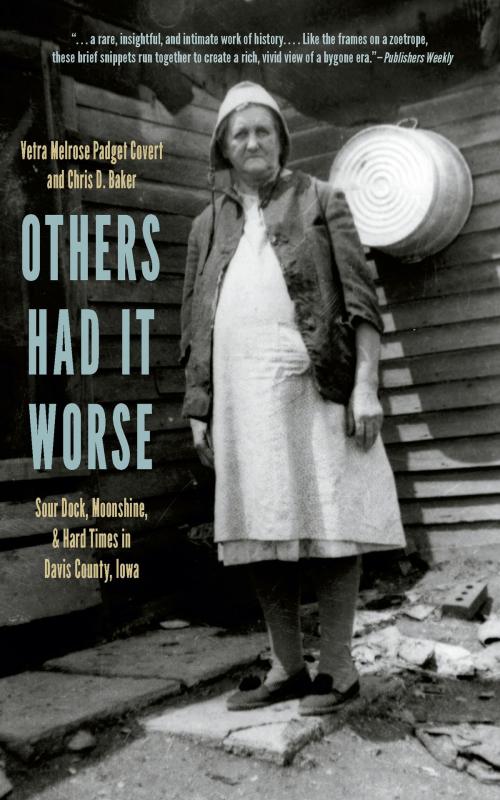Others Had It Worse
Sour Dock, Moonshine, and Hard Times in Davis County, Iowa
Nonfiction, History, Americas, United States| Author: | Vetra Melrose Padget Covert, Chris D. Baker | ISBN: | 9781609382070 |
| Publisher: | University of Iowa Press | Publication: | September 1, 2013 |
| Imprint: | University Of Iowa Press | Language: | English |
| Author: | Vetra Melrose Padget Covert, Chris D. Baker |
| ISBN: | 9781609382070 |
| Publisher: | University of Iowa Press |
| Publication: | September 1, 2013 |
| Imprint: | University Of Iowa Press |
| Language: | English |
In 1977, while studying journalism at the University of Iowa, Chris Baker gave his grandmother a notebook and asked her to write about her childhood. Years later, long after her death in 1990, he found the tattered yellow notebook. In twenty-nine handwritten pages, the woman he knew as Grandma Covert had recorded her younger life in rural Iowa between 1920 and 1929. Writing about herself from the ages of four to thirteen, Vetra Covert sent a simple message back to her grandson: “That’s just the way it was. Others had it worse. We got by.”
Captivated by this glimpse of a woman very different from the more formidable grandmother of his memory, Chris Baker reframed Vetra’s journal to create a narrative of her childhood and a window into rural Iowa life in the 1920s. Transcribing her words into nine chapters that illuminate home, family, neighbors, school, and social life, he has composed a collection of candid, whimsical, sometimes ornery stories that will resonate with anyone who has ever tried to decipher the lives found in old letters and photos.
Vetra’s was not a romantic little-house-on-the-prairie childhood. She grew up with seven brothers and sisters (every new baby was “a supprise”) in a dilapidated log cabin near a small town now vanished from the Iowa map. Two rooms up, two rooms down, no plumbing, no electricity, holes in the roof and floor so big “you could of throwed a cat through them.” Her father was a bootlegger-farmer who measured his corn yield in gallons, not bushels, a moonshiner occasionally harassed by federal agents. Although family stories now present him as a quaint old-timer, the reality of living with him was much starker.
In his introduction to Vetra’s recollections, Chris Baker reveals the harsh truths underlying her authentic, uncomplaining account. By honoring her legacy, he discovered a newfound respect for her and for her family’s ability to survive despite the devastating forces of poverty, isolation, and the looming Great Depression. Together he and his grandmother have created an enduring chapter in family history.
In 1977, while studying journalism at the University of Iowa, Chris Baker gave his grandmother a notebook and asked her to write about her childhood. Years later, long after her death in 1990, he found the tattered yellow notebook. In twenty-nine handwritten pages, the woman he knew as Grandma Covert had recorded her younger life in rural Iowa between 1920 and 1929. Writing about herself from the ages of four to thirteen, Vetra Covert sent a simple message back to her grandson: “That’s just the way it was. Others had it worse. We got by.”
Captivated by this glimpse of a woman very different from the more formidable grandmother of his memory, Chris Baker reframed Vetra’s journal to create a narrative of her childhood and a window into rural Iowa life in the 1920s. Transcribing her words into nine chapters that illuminate home, family, neighbors, school, and social life, he has composed a collection of candid, whimsical, sometimes ornery stories that will resonate with anyone who has ever tried to decipher the lives found in old letters and photos.
Vetra’s was not a romantic little-house-on-the-prairie childhood. She grew up with seven brothers and sisters (every new baby was “a supprise”) in a dilapidated log cabin near a small town now vanished from the Iowa map. Two rooms up, two rooms down, no plumbing, no electricity, holes in the roof and floor so big “you could of throwed a cat through them.” Her father was a bootlegger-farmer who measured his corn yield in gallons, not bushels, a moonshiner occasionally harassed by federal agents. Although family stories now present him as a quaint old-timer, the reality of living with him was much starker.
In his introduction to Vetra’s recollections, Chris Baker reveals the harsh truths underlying her authentic, uncomplaining account. By honoring her legacy, he discovered a newfound respect for her and for her family’s ability to survive despite the devastating forces of poverty, isolation, and the looming Great Depression. Together he and his grandmother have created an enduring chapter in family history.















